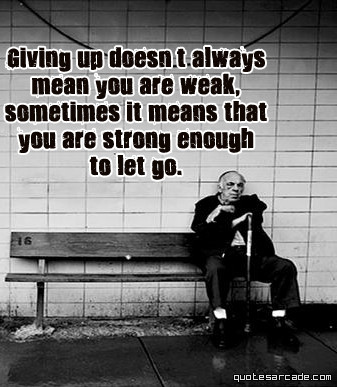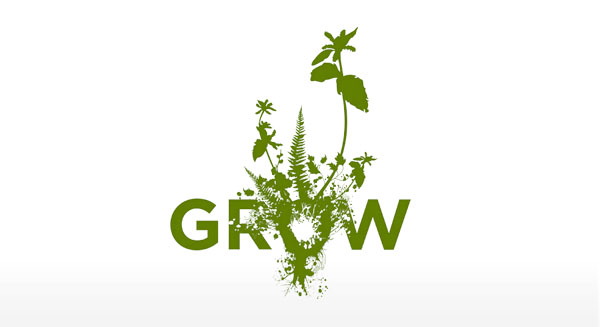The Strength of Surrender
“Surrender: to give oneself up into the power of another…or to give oneself
over to something (as an influence).”
-Miriam Webster’s Dictionary
I mentioned the concept of surrender in last month’s article on my decision to sign into a weight loss center. I began to chew on that concept, and re-realized how important to me the idea that true surrender takes strength and that it is the key to all kinds of awesomeness.
You don’t believe me already. There’s that hitch in your gut or your heart thinking Surrender is weak, Keith. You’re right, in one sphere—that of standing up for a cause that is righteous. Those causes which seek the greater good are few but powerful. This isn’t about that type of surrender. This is about surrender for the greater good of the self, by the self and for the self. You could call it letting go.
 “Letting go,” according to Dr. Deonesea Fourtounas, “is characteristic of human nature…and an integral part of life….The dialectic of holding on and letting go is the dialectic of life and death.” (Fourtounas, 2003) That’s not an understatement. People are living conflict and breathing contradiction. We obsess over what we hate, we crave what is killing us and we abhor things that can heal us. We seek to control that which is uncontrollable and grow to have no control over that which we truly can change; Most often because that change requires the initial aid of others and the admission that we have lost control.
“Letting go,” according to Dr. Deonesea Fourtounas, “is characteristic of human nature…and an integral part of life….The dialectic of holding on and letting go is the dialectic of life and death.” (Fourtounas, 2003) That’s not an understatement. People are living conflict and breathing contradiction. We obsess over what we hate, we crave what is killing us and we abhor things that can heal us. We seek to control that which is uncontrollable and grow to have no control over that which we truly can change; Most often because that change requires the initial aid of others and the admission that we have lost control.
Admitting that we have no control runs so counter to traditional American culture and values that it might be considered treason. We were all raised—by degrees—to seek, attain and keep control of many things that we truly have no control over. Control is the flip-side of surrender, and a topic William Berry, psychotherapist and professor at Florida International and Nova Southeastern Universities has great experience with. “The use of control is paradoxical,” he says, “We believe taking control will bring us security and happiness, yet its overuse causes unhappiness, anxiety, and malaise. In the treatment of clients with addiction problems, depression, marital issues, anxiety, and anger issues a common thread is control.” (Berry, 2011)
The Sphere’s of Surrender
“The second noble truth of Buddhism states desire is the root of all suffering.
It means…when one attempts to control life,
to exclude everything they do not like, then suffering occurs.”
-Pr. William Berry, Psychotherapist
 “Life is a casting off” was said in Author Miller’s Death of a Salesman and it contorts my mouth into a sour lemon snarl every time I read it. Such a bleak play that you might as well call it Debbie Downer Does Death. It’s the 1940s version of Requiem for a Dream and it puts much of America’s negative, hopeless perspective on surrender into context.
“Life is a casting off” was said in Author Miller’s Death of a Salesman and it contorts my mouth into a sour lemon snarl every time I read it. Such a bleak play that you might as well call it Debbie Downer Does Death. It’s the 1940s version of Requiem for a Dream and it puts much of America’s negative, hopeless perspective on surrender into context.
While loss is never fun, it has the potential to be survived and have a value all its own. Today we’re all about that value. I could argue points and get all clinical, but instead I’m simply going to offer an itemized list of all the situations that I can think of in which surrender is key to awesomeness. Please feel free to add more in the comment section below.
The impact of surrender can be seen through the spheres of personal situations, social situations and existential states. See if you agree.
Personal Situations
Therapy – I’m very cognizant of the fact that when a person sits down in front of me, if they are planning to work, it is because they’ve come to grips with their own issue of control and are placing some of that fragile power in my hands. It is humbling and scary, but ultimately profound because two heads can change one life, if that life is surrendered to the idea of change.
Parenthood – Do I even need to speak on this? Terror lurks in the heart of every good parent who gazes at their newborn with love. Simply bringing a life into the world is surrendering part of your soul to their every need, your heart to ache like theirs and your mind to an armada of irrational worry.
Childhood – An awesome child is one who can enjoy being a kid and having their decision making surrendered to the big, annoying folk who love the word “no.”
Medical Procedures – None of us can operate on ourselves, or should. Long before we’re unconscious on an operating table or having chemo pumped into us, or taking a pill with an unpronounceable name, we’re surrendering to another person and to a diagnosis. But, with surrender, we get the awesome chance to heal.
Faith – “According to studies about happiness, people who consider themselves religious or spiritual suffer less drug abuse, suicide, and an overall higher rating of well-being… Faith cannot be minimized.” (Berry, 2011) Faith is surrender, and it’s truly awesome. Thank God for God.
Addiction Recovery – People become substance dependent because they want to control a negative feeling, but not surrender their life to change. “Eventually, the person comes to rely on the substance; then the substance dictates the mood…Part of the core of addiction is a desire to control one’s state through inappropriate means.” (Berry, 2011) However, once that life is surrendered to change, or the self is surrendered to the idea that sometimes it’s okay to not like the world or how we feel, awesomeness will ensue.
Social Situations

Love – I annoy my wife by saying “love is a verb not a noun.” Love is active and that first action is when you go from Oh, crap. I’m in love. To I’m jumping anyway, even though you will hurt me, are imperfect and do all those annoying things like saying “love is a verb.” Interestingly, the more you surrender in a balanced way (see below) the more awesome it gets. Which brings us to…
Marriage – I truly believe that marriage is not about being happy. Marriage is about learning to be a better person by living through the eyes of the person who you acknowledged has the ability to see your good and your bad and love you anyway. Marriage is not about changing your spouse. Marriage is about listening to your spouse with your grown-up ears, surrendering your selfishness, and choosing to be a better person because it’s awesome. Marital conflict “is the result of wanting to have your way in the situation and not getting it.” (Berry, 2011) A surrendered, awesome marriage is wanting to be the best person for yourself and your spouse and wanting to make the best decisions for your marriage, not have your way. That’s hard-hard-hard to do, but impossible without surrender.
Existential States
 Theme Parks – “Theme Parks are an existential state?” Yes. Just go with it. From roller coasters to the serene carrousel, we find true enjoyment in surrendering our welfare to a machine and the carney that pilots it. We just try to not think too hard about the carney.
Theme Parks – “Theme Parks are an existential state?” Yes. Just go with it. From roller coasters to the serene carrousel, we find true enjoyment in surrendering our welfare to a machine and the carney that pilots it. We just try to not think too hard about the carney.
Traffic – “This scenario is a common frustration,” says Berry “The situation is out of personal control. Switching lanes, trying to cut in front of others, or leaving the highway and trying an alternate route, are exercises in control. However, this can lead to further frustration when efforts are ineffectual and control is again thwarted. The inability to control the situation leads to the feeling of frustration and anger.” (2011) Look. No amount of surrender will make traffic awesome. But, surrender to the idea that there will be traffic may help you to plan out your radio station surfing or CD shuffle or buy a book on tape to make the situation less sucky.
Grief and Loss – Like traffic, no amount of surrender can make loss awesome. But a collaborative study published in Psycho-Oncology “found that goal reengagement (being able to set new goals)” after being diagnosed with breast cancer, and finding new ways to live your life instead of holding on to old things “was associated with more physical activity, increased emotional well-being and fewer physical symptoms…which contributed to an improved well-being.” (Wrosch and Sabiston, 2012) Letting go lets you live better.
Worry – “Worry…becomes an attempt to control, or a wish to control, what is uncontrollable.” (Berry, 2011) Controlling only what you really can, then surrendering yourself to the uncontrollable, will lead to awesomeness.
Art – Be it writing, fine art, music or some other form of beauty building, the creative process is surrender at its most awesome.
The Balance
“Mommy’s all right, Daddy’s all right; They just seem a little weird.
Surrender. Surrender, but don’t give yourself away…”
–Cheap Trick, Surrender
 Thus armed with this list of the awesome benefits of surrender, you now seek to surrender to everything. Wait, grasshopper and heed the words of sage Cheap Trick (above—or click the link and hear the whole song, complete with a quintuple guitar).
Thus armed with this list of the awesome benefits of surrender, you now seek to surrender to everything. Wait, grasshopper and heed the words of sage Cheap Trick (above—or click the link and hear the whole song, complete with a quintuple guitar).
While it is true that through surrender “…a person can reduce the distress that arises from the desire to attain the unattainable, while continuing to derive a sense of purpose in life by finding other pursuits of value,” there must be balance in life. (Wrosch and Sabiston, 2012). We must always remember that the goal of surrender is positive growth. As a child we surrendered to our parents more responsible rules, as teenagers we surrendered (by degrees) to our burgeoning individuality, as young adults we surrendered our childish views of the world, as adults we surrender our selfishness to our kids and our spouses, and with some of us, we surrender our faith to our God. But, as Cheap Trick says, “don’t give yourself away.”
Surrender that is positive growth leads to awesomeness. Surrender that is simply abandon only leads to abandon. Surrender must always retain the sense of self. In that discipline of retaining self while remaining selfless we find the true strength of surrender.
__________________________________
Berry, W. (2011, June 6). Let Go, Be Happy: Attempting to inappropriately control events brings unhappiness. Psychology Today Online Retrieved April 28, 2012 from [click author for link]
Fourounas, D. (2003) The Experience of Letting Go: A Phenomenological Study. University of Pretoria etd. Retrieved April 30, 2012 from [click author for link]
Wrosch, C. and Sabiston, C. (2012, April 23) Letting Go Can Boost Quality of Life. Psycho-Oncology via McGill Newsroom. Joint Study by Concordia University’s Department of Psychology and Centre for Research in Human Development and of McGill’s Department of Kinesiology and Physical Education and the Health Behaviour and Emotion Lab. Retrieved April 30, 2012 from [click author for link]


